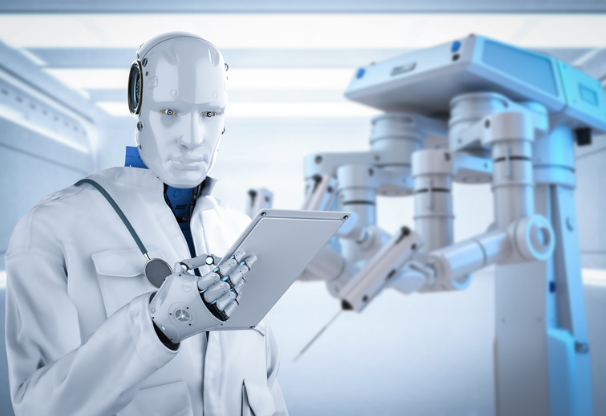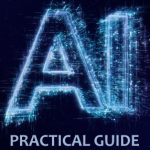AI in Healthcare
The application of artificial intelligence (AI) is causing a revolution in the healthcare business, which is resulting in game-changing innovations that are leading to better outcomes for patients, lower costs, and more overall efficiency. Diagnostics, treatment planning, and predictive analytics are three areas where AI in healthcare has made substantial gains in recent years. In this article, we will investigate the present applications of artificial intelligence in healthcare, as well as the ways in which these applications are reshaping the way in which medical professionals diagnose and treat illness.
AI in Diagnostics:
AI Medical Imaging
Medical imaging that is powered by AI has become an indispensable tool for providing accurate and timely diagnoses of a wide range of medical disorders. Medical pictures, such as X-rays, CT scans, and MRI scans, can be analyzed by deep learning algorithms, which can then find patterns and anomalies that the human eye might miss. These artificial intelligence (AI) systems can detect a variety of diseases, ranging from tumors and fractures to heart conditions and neurological disorders, and they can do so frequently with better precision and speed than traditional approaches.
For instance, artificial intelligence algorithms have demonstrated a high level of efficacy in the early detection of lung cancer in chest X-rays and CT scans, which paves the way for early intervention and has the potential to save lives. In a similar manner, artificial intelligence has been applied to the process of analyzing mammograms in search of early indicators of breast cancer. This has resulted in an increased rate of accurate diagnoses and a decreased rate of false positives.
AI in Pathology
The application of AI technologies has completely altered the practice of digital pathology, which entails scanning and digitizing tissue samples in preparation for diagnostic examination. There is a remarkable level of accuracy that can be achieved when using machine learning algorithms to examine microscopic photographs of tissue samples to detect anomalies such as cancer cells. The diagnostic procedure is not only sped up because of this, but the accuracy of the results is also improved.
Pathology systems that are powered by AI have shown outstanding performance in detecting many different types of cancer, including those that affect the skin, the breast, and the prostate. In addition, these technologies can examine and categorize tumors according to the molecular characteristics they possess, which supplies vital information for the purpose of tailored treatment planning.
AI in Genomics:
The study of the genetic composition of an individual, which is referred to as genomics, is a very important part of both comprehending the factors that lead to the development of numerous diseases and locating treatments that are successful. The examination of genomic data has been considerably sped by AI, which has enabled researchers and clinicians to make judgments regarding diagnosis and treatment that are better informed.
Algorithms that use machine learning may sift through enormous volumes of genetic data to find patterns and associations that may signal the presence of a specific disease or a patient’s reaction to a particular treatment. This has resulted in the development of customized medicine, which is a form of treatment that is adapted to the specific genetic profile of an individual patient.
Avoiding the Spread of Disease
Predictive analytics powered by AI also play an important part in the fight against infectious diseases on a population scale. Algorithms that use machine learning can examine massive data sets, such as those found in electronic health records, to spot patterns and trends in the incidence of chronic disorders or the transmission of infectious diseases. Officials in charge of public health can use this information to develop more specific strategies for disease prevention and to more effectively allocate resources.
For instance, artificial intelligence was applied during the COVID-19 pandemic to predict the spread of the virus and identify possible hotspots. This helped public health initiatives and informed government policy.

AI in the Planning of Treatment
Medicine Tailored to the Patient
The development of AI has paved the path for personalized medicine, which enables medical professionals to create individualized treatment plans for patients based on the patient’s distinct genetic makeup, medical history, and any other pertinent data. AI can determine the treatments and dosages that are most likely to be successful for individual patients by evaluating huge volumes of data. This helps improve treatment outcomes while simultaneously lowering the likelihood of undesirable side effects.
For instance, healthcare AI-driven systems have been utilized to personalize chemotherapy protocols for cancer patients, thereby increasing the effectiveness of treatment while simultaneously reducing the risk of harmful side effects. In addition, artificial intelligence has been instrumental in the discovery of innovative medicine combinations for rare genetic diseases, giving patients who suffered from maladies that were previously untreatable a glimmer of hope.
Therapy with Radiation
Radiation therapy is one of the most frequent treatments for cancer. It includes directing high-energy radiation onto tumors in order to kill cancer cells while limiting the amount of damage done to healthy tissue. The planning and delivery of radiation therapy has been considerably enhanced by AI, which has led to an increase in both the accuracy and effectiveness of treatment.
Algorithms that learn through machine observation can examine medical photos and 3D models of a patient’s anatomy in order to identify the radiation dose that is ideal and the area that should be targeted. This reduces the quantity of radiation that is exposed to the surrounding healthy tissue while ensuring that the tumor receives the highest amount of radiation possible. It is also possible for AI to make real-time adjustments to the treatment plan in response to shifts in the location and size of the tumor, which helps to maintain accurate targeting throughout the course of treatment. AI in healthcare for cancer alone has enormous potential going forward.
AI Surgery Preparation
Preparation for Surgery:
Artificial intelligence has made significant strides forward in the field of surgical planning, which has provided surgeons with helpful insights and improved the accuracy of surgeries that are more complicated. AI algorithms are able to examine medical pictures and patient data in order to build patient-specific surgical plans that are comprehensive and take into account a variety of parameters like the size, location, and features of the target area.
For instance, artificial intelligence has been used in neurosurgery to construct intricate 3D models of a patient’s brain. These models allow neurosurgeons to visualize the precise location of tumors and other important structures in the brain of a patient. This information assists surgeons in navigating the process safely, which in turn reduces the likelihood of complications occurring and leads to better outcomes for patients.
Analytics Predictive of the Future:
Healthcare AI Does Risk Assessment
A patient’s risk of developing specific health diseases or experiencing unfavorable events, such as hospital readmissions or issues following surgery, can be evaluated using predictive analytics that are powered by artificial intelligence (AI). AI can recognize patterns and trends in large volumes of patient data, including medical history, demographic information, and genetic information, that suggest a higher risk for specific issues. This is accomplished by analyzing the data.
These insights make it possible for healthcare practitioners to adopt focused interventions and preventative measures, thereby improving the outcomes for patients and decreasing the strain on healthcare systems. AI has been used, for instance, to determine the possibility of a patient getting diabetes. This paves the way for early intervention and the adjustment of lifestyle choices that can prevent or delay the start of the disease.

Monitoring of the Patient
The use of artificial intelligence has completely transformed the process of monitoring patients, making it possible for medical professionals to monitor patients’ health in real time and identify potential problems before they become serious. Wearable technologies and remote monitoring systems that are powered by artificial intelligence can continuously gather and evaluate patient data, such as vital signs, physical activity, and sleep habits.
Then, machine learning algorithms can identify deviations from a patient’s baseline health status, which can alert medical professionals to potential health concerns. This preventative method of monitoring patients can help avoid complications, cut down on the number of times patients must be readmitted to the hospital, and improve their overall outcomes.
AI in Healthcare Final Thoughts
Diagnostics, treatment planning, and predictive analytics have all been revolutionized as a result of the application of artificial intelligence in the healthcare industry, which has definitely changed the landscape of the healthcare industry. Medical personnel are now able to diagnose diseases, design individualized treatment plans, and put into practice preventative measures that are specifically targeted thanks to the extraordinary power of artificial intelligence (AI) to analyze massive volumes of data and generate significant insights more correctly. As artificial intelligence technology continues to improve, its impact on healthcare will only continue to expand, opening the way for an AI healthcare system that is more efficient, effective, and patient-centric.
